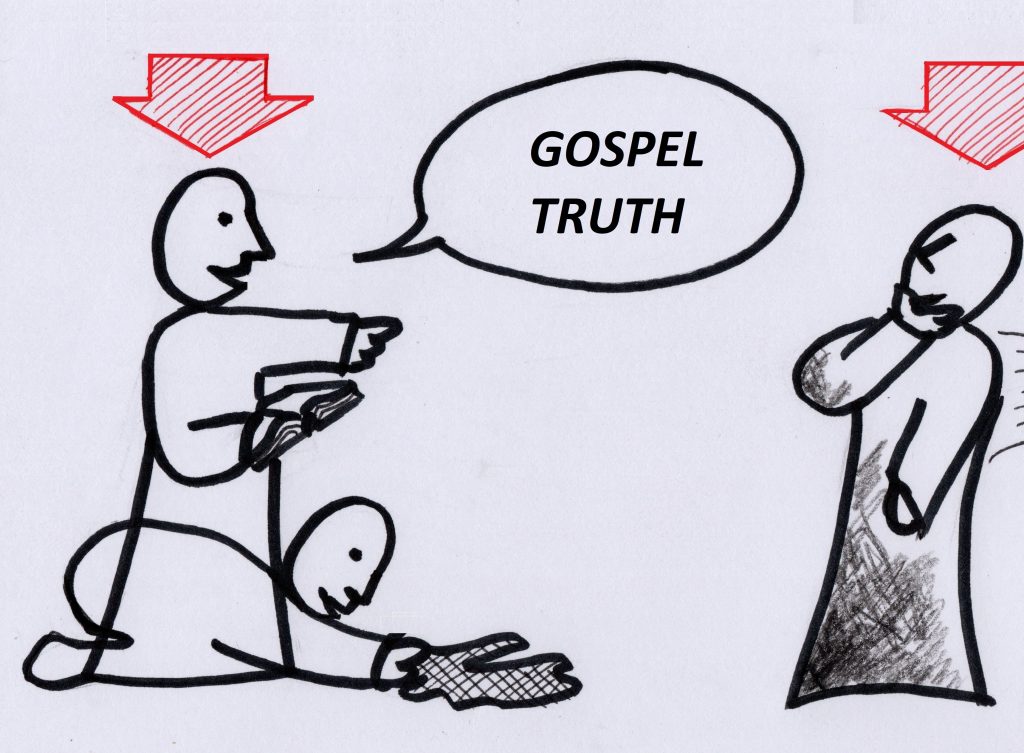TITUS 03 - Interpreting & applying the main themes
- In the last unit (“TITUS 02“) we have reconstructed the story and the background of the letter of Titus.
- Now we will look at some main themes, doing both Interpretation and Application.
- Application is not really difficult, as the Cretan society and our modern society have many parallels, so the issues of character, behavior and leadership apply to both.
Opening Paragraph Titus 1:1-3
Instruction
- Read Tit 1:1-4.
- In this opening paragraph most of the letter’s main themes are found.
- Try to create a visual picture of what Paul is saying.
- Think about the following questions:
- How does Paul describe himself? Notice the sequence. Why do you think he is saying it this way?
- How does Paul state his authority as an apostle? Why do you think he states his authority?
- Who is Paul’s calling for?
- How does Paul describe God? Why do you think he does that?
- What is the link between ‘knowledge of the truth’, ‘godliness’ and ‘hope of eternal life’?
- If you find it helpful, try to draw what these verses are saying!
findings and thoughts to consider

- Paul describes himself as first ‘servant of God’ and second as ‘apostle of Jesus Christ’.
- This is a statement of both of humility and also of apostolic authority.
- The sequence is important: with God it is from servant-hood that authority comes.
- This is consistent with Jesus’ explicit teaching “Whoever wants to be first must be the last of all and servant of all” (Mrk 9:35) or “You know that among the Gentiles those whom they recognize as rulers lord it over them, and their great ones are tyrants over them. But it is not so among you; but whoever wishes to become great among you must be your servant, and whoever wishes to be first among you must be slave of all” (Mrk 10:42-45).
- Jesus defines leadership as servanthood.
- This sets the tone for the letter: when characteristics will be listed that are needed for somebody to be a leader (Tit 1:5-9, 2:1, 2:7-8), selflessness and self-control will feature strongly.
- Paul states his apostolic authority: “Paul … an apostle of Jesus Christ” and “he revealed his word … which with I have been entrusted by the command of Go our Savior”.
- He states his authority and then passes it on to Titus (Tit 1:5), while also recommending him as loyal (Tit 1:4).
- Paul makes sure his departure does not create problems or confusion. He does his best to give Titus a good footing.

- Paul’s calling is “for the sake of the faith of God’s elect and the knowledge of the truth”. God’s elect means the believers or the church.
- Paul’s calling – all callings – are not primarily for oneself (though a calling is a blessing) but for others.
- Abraham’s calling was to be a blessing to all nations (Gen 12:1-3).
- Israel was called to be a priestly nation, revealing God to other nations (Exo 19:4-6, Deu 4:6-7).
- Jesus was called not to be served but to serve (Mrk 10:45) and the believers are called to be a witness to the nations (Acts 1:8).
- Paul describes God as “God, who never lies”. This is in very clear contrast to Zeus, the main god revered in Crete, who is a cheat and a notorious liar.
- This is also in very clear contrast to Crete’s general culture of lying.
- Paul counters the background of the believers, showing them just how different God is.
- God is reliable. He promises and he keeps his word. He does the right thing at the right time, according to his word.

- What is the link between “knowledge of the truth”, “godliness” and “hope of eternal life”?
- Paul works for people to come to the “knowledge of the truth” through preaching the gospel and teaching.
- This knowledge needs to be in “accordance with godliness”, which means that knowledge without practice is no real knowledge.
- Practice of godliness is an essential fruit of knowledge, of getting the gospel.
- This changed life – with all its challenges – we can only do this in the “hope of eternal life”.

Choosing Church Leadership
- We will first look at two general observations concerning the passage on leaders, then look at the details.
Instruction
- Read Tit 1:5-9, the passage about what leaders to appoint in the church.
- Think about exactly what roles is Titus to appoint good people for?
findings and thoughts to consider
- In Tit 1:5 Paul says: “I left you behind in Crete for this reason … appoint elders in every town” – the word here is ‘presbuteros’ in Greek, meaning ‘elders’.
- In Tit 1:7 he says: “For a bishop, as God’s steward, must be blameless …”. The work for bishop or steward is ‘episkopos’ in Greek.
- Some say that the “for” in this verse shows that elders and bishops are just two descriptions of one and the same type of leader.
- Others say that there are in fact two list of character requirements here, one for elders (the lower level of leadership) and one for bishops (the higher level of leadership).
- If the second opinion is right, this yields another interesting point: Their are only 5 requirements for an elders, but 14 requirements for a bishop. That would show a clear principle: the higher up the leadership, the more conditions there are.
- This is a very important issue. In our thinking the higher up a leader is, the more free he is to ‘do whatever he wants’. But God says exactly the opposite: the higher up in leadership the more stringent the character and attitude requirements, for a person with more influence and power – if uncontrolled – can do far more damage, hence the strict criteria.
- This is also expressed by Jam 3:1 “Not many of your should become teachers, my brothers and sisters, for you know that we who teach will be judged with greater strictness.” The unaccountable, willful, arbitrary, self-indulgent, powerful leader is anything but Biblical.
Instruction
- Read Tit 1:5-9 again.
- For every characteristics that Paul lists, ask: is this a character or attitude requirement or a skill requirement?
- Count the character or attitude requirements and the skill requirements separately.
findings and thoughts to consider
- Quite shockingly virtually nothing Paul demands for leadership has anything to do with skill.
- The only requirement that has a skill component is the last one: “He must have a firm grasp of the word … so that he may be able both tot preach with sound doctrine and to refute those who contradict it.”
- But other than that the list is focusing entirely on character and attitude.
- This is and interesting issue when contrasted with modern day church leadership appointment:
- We think degrees and skills are vitally important for church leadership (divinity degree, speaking skills, management skills, English skills, training abroad etc.) and only in second line do we evaluate what Paul considers vitally important.
- Maybe this is the reason the church struggles with leadership issues?
Instruction
- Read Tit 1:5-9 again.
- For every characteristics or attitude listed think:
- Why exactly these characteristic or attitude?
- What would be the consequences of a leader having them?
- What would be the consequences of a leader not having them?
findings and thoughts to consider Elders (Tit 1:5-6)
- “blameless” – not meaning absolute moral perfection, for nobody is without sin. But meaning to live a transparent life, to be honest, to own up and repenting when faced with a problem, asking forgiveness, being committed to improve.
- “ once or “husband of one wife” – What exactly does this mean?
- Some say: only men can be elders for only men can have a wife.
- But if so, then also: no unmarried person, no widower can be an elder.
- The day an elder’s wife dies he needs to cease being an elder.
- This would also excludes Paul and Jesus from eldership, which really doesn’t make sense.
- Better interpretation: married only once means that a polygamous person cannot be held up as a model.
- Though a polygamous person may get saved and be in church in this state of polygamy (for to abandon wives would be not right), Paul demands self-control, monogamous behavior and no self-indulgence for elders.
- The command is not anti-women nor mandatory married state but simply against polygamy.
- “whose children are believers, not drunkards, not rebellious” – Paul requires that an elder has already proven himself by being good leadership in his family.
- If an elder doesn’t do well with his own family, he isn’t the encouraging example he needs to be.
- Sometimes these words have resulted in great pressure on pastors’ or elders’ children.
- But God puts the pressure on the parent, not on the child.
- Elders are meant to be an example in having happy, reasonable families where children thrive.
findings and thoughts to consider Elders / Bishop (Tit 1:7-10)
- “God’s steward” – Steward means caretaker, not owner, somebody accountable to God, somebody to whom authority is given, but authority under God. A steward represents God, he is not self-willed, but rather responsible, caring, releasing and building others, blossoming and encouraging others.
Blameless – as above - “not arrogant” – Arrogant people are sure they are right, they are stubborn, blind, insisting on their opinion, not considering others’ view points. To not be arrogant means to listen, to consider, to not be self-centered, to be self-evaluating. The ability to be listening, to be understanding of others is vital for an elder.
- “not quick tempered” – Angry people are scary people. Showing anger often is a means to exercise power, to force others to cooperate. Anger is often uncontrolled and creates an atmosphere of fear, of ‘I never know what next’. One outbreak of anger can undo months of good behavior. Losing temper means losing control means being unsafe. Angry people are not reliable, there is often a breach of trust. Though anger as an emotion is okay (when injustice happens, when boundaries are overstepped, etc) and all people get angry at times, anger is not okay as an action, and especially not as a repeated action.
- “not addicted to wine” – This is not so much a full prohibition of alcohol, but rather a definite prohibition of drunkenness, of addiction, of a loss of self-control. Children of drunkards never know in what state they find their parent in. Wine addiction means anger, unreliability, broken promises, neglect and sometimes violence and abuse.
- “not violent” – Violence is an extreme of anger, it means to forcefully have one’s way, it means controlling others, threatening others, abusing others, hurting others, which is absolutely unacceptable in a leader.
- “not greedy for gain” – The combination of spiritual leadership and any form of greed is always a disaster. Greed, selfishness, self-indulgence, jealousy will lead to ulterior motivations in ministry. It will ruin the highest callings, outstanding giftings or most thriving ministry. There will be the ever increasing temptation for the leader to use his role and authority wrongly. Proverb: “Money is a good servant and a bad master.” The great corrupters of the human heart (according to De 17:16-20) are: sex, power, money and fame.
- “Hospitable” – This doesn’t mean only to be hospitable and serving tea, it means to be welcoming, open and accommodating and warm. Literally “hospitable” means “lover of the foreign”. A leader needs to be accommodating, interested, open to the new and different, open to change, open to release others.
- “Lover of goodness” – An elder must love everything good and right. In the Bible “to love” means “to do, to practice”, not just to cognitively agree that something is good. An elder needs to be actively doing good, serving, helping, caring, involving in people’s lives and helping in practical ways.
- “Prudent” – A leader needs to be wise, principled, not partial, not one-sided, but rather have good judgment and a sense of fairness. People who take sides, who are naive thinking ‘one can’t do anything right and the other can’t do anything right’ are not wise.
- “Upright” – meaning honest, transparent, open, concerned with doing good, loving what is right
- “Devout” – meaning committed, wholehearted, obedient. Leaders need to be obedient to God, to godly character, even to people
- “Self-control” – almost a summary of much that has been said before. To be self-controlled means to choose what is right over what is convenient. To serve other first, to work hard, to seek the welfare of those under my care will require self-control in daily life.
- Firm grasp of the trustworthy word so that able to preach sound doctrine and refute those who contradict – An elder needs to know and understand the word and be able to share the word, to teach. He needs to have good judgment, strength of principle and understand implications. He needs to be stable and not be easily swayed.
- Paul’s list of characteristics is very practical and clearly important. It easy to see just how much the church also today needs this kind of leadership. Some find the list so daunting that nobody ever seems to qualify.
- But remember: Paul is wanting not only to give a check-list when searching for elders, he is also teaching all believers in what direction they need to develop their character. The list is therefore not for “the few” but for “all”, all who want to become more godly and grown in God.
Titus himself

Instruction
- Read the following passages addressing Titus: “Show yourself in all respects a model of good works, and in your teaching show integrity, gravity, and sound speech that cannot be censured; then any opponent will be put to shame, having nothing evil to say of us” (Tit 2:7-8) and “Declare these things; exhort and reprove with all authority. Let no one look down on you” (Tit 2:15).
- Think about the following questions:
- What are Paul’s words addressed to Titus?
- How are these instructions essential for Titus’ role in the church?
- What can you learn from them?
findings and thoughts to consider
- These words are like a summary of what has gone before: Leaders need to be models and examples, first and foremost Titus, who is given the task to teach what makes a good leader in the Cretan churches and appoint their elders.
- Note also Paul’s encouragement to him: Titus is worthy of leadership, he has given him authority, his role is crucial for the Cretan churches, so overly much timidity or self-effacing humility is not what is needed.
- Notice also that authority is always ‘given’, and never ‘taken’ … God gives it to the person of character; and humans, acknowledging that character, give it to the leader.
Character requirements for different Groups in the church
Older men Tit 2:2

Instruction
- Read Tit 2:2: “Tell the older men to be temperate, serious, prudent, and sound in faith, in love and in endurance.”
- Think about the following questions:
- What characteristics does Paul require for older men?
- Why exactly these characteristics?
- What would be the consequences of older men having them?
- What would be the consequences of older men not having them?
findings and thoughts to consider
- “Temperate” – Temperate means self-control, to choose what is right over what is convenient, to consider others rather than indulging own desires. It is the way that selflessness and humility shows itself.
- Why is Paul requiring this for older men (though it is also mentioned for leaders, young women and young men, Tit 1:8, 2:5, 2:6).
- In most cultures older men, as ‘pater familias’, as the leader of the immediate and extended family as well as of standing in society naturally have great influence.
- Their attitudes can be decisive. If they have no self-control – for example in areas of anger, finances or sexual conduct – they set the tone for their families and environments.
- Lack of self-control in finances can be disastrous, as usually money and assets are held by the older male, and daily financial decisions are in their hands.
- They can easily ruin the assets of an entire family. Example: Father loosing all family land to gambling.
- Lack of self-control in anger can make them tyrannic in their own house, demanding unquestioning obedience, controlling everybody and creating an atmosphere of fear.
- They will likely be unaware of the needs and concerns of members of the family and unlikely to take advice. Both sets them up for further unwise choices.
- Lack of self-control in sexual matters can create havoc in a family.
- It is especially the senior males, who can ‘have their way’ in a family, which is why in the Law of Moses specifically addresses this in Lev 18:6-23: sexual relations with a sister, a daughter-in-law, a grand-child, an aunt etc. are all forbidden.
- These laws are clearly restrictions on the sexual conduct of males, especially senior males in an extended family, people a young girl may find hard to say no to.
- Example: Case of a man agreeing with a family for a bride for his son, and then taking her himself as his second wife, breaking relationship with his wife, son and forcing a young women into a honorless marriage.
- “Serious” – Serious, grave, dignified, worthy of respect. Since older men naturally are viewed with respect, all the more they need to truly be worthy of that respect, they need to live up to the respect and honor they are naturally receiving.
- “Prudent” – Prudent means wise in judgment, sober and considerate in decision making. This point is similar to the first one on being temperate. Family fathers are looked to for wisdom, advice, counsel, protection, support. If they are indeed prudent and wise, they can do much good, but the opposite is sadly also true.
- “Sound in faith, in love, in endurance” – these are needed characteristics for all believers. Endurance is especially needed when the body doesn’t want anymore as before, a sign of getting older.
- In summary unlike our culture – that gives more freedom to cut corners to those who are senior – God has high demands on them.
Older Women Tit 2:3-4

Instruction
- Read Tit 2:3-4: “Tell the older women to be reverent in behavior, not to be slanderers or slaves to drink; they are to teach what is good, so that they may encourage the young women.”
- Think about the following questions:
- What characteristics and attitudes does Paul require for older women?
- Why exactly these characteristics and attitudes?
- What would be the consequences of older women having them?
- What would be the consequences of older women not having them?
findings and thoughts to consider
- “Reverent in behavior” – older women, who are mothers and senior persons, receive a natural respect, they need to behave in a way truly worthy of the respect. This is similar to older men.
- “Slanderer” – a great weakness of women tends to be their loose mouth, spending major time on hearing and sharing news about people.
- Maybe this is the negative side of women’s natural tendency to be concerned with people’s lives and relationships.
- Maybe it is partially due to women not having a voice in decisions, so that they rely on the influence of their words (like nagging, pouting). Paul challenges them.
- “Slaves to drink” – though in some cultures women do not have the freedom to practice addictions like smoking, drinking or gambling, but other forms of addiction, for example the addiction to television serials is rampant. These are also not harmless, often women spend something like a third of their time on TV, neglecting children or other duties.
- “Teach what is good” – Paul commands older women to teach, to use their words in a constructive manner: teaching, encouraging, modeling. Women are here commanded to teach, which is a role of importance, of influence.
- In summary Paul wants older women not to abdicate responsibilities after their children are grown, rather he wants them to fulfill a vital and powerful function as role models, teachers, influencers, counselors and encouragers.
- Paul values the contribution, the role, the blessing older women can be and does not relegate them to the back-row nor give them up to self-indulgence.
- Some have interpreted these verse to mean that women should only teach women but other Scriptures mention women teaching (Acts 18:26), such a restrictive interpretation is not warranted, rather an example of godly activity is given: teaching younger women.
Younger women Tit 2:4-5

Instruction
- Read Tit 2:4-5: “so that they may encourage the young women to love their husbands, to love their children, to be self-controlled, chaste, good managers fo the household, kind, being submissive to their husbands, so that the word of God may not be discredited.”
- Think about the following questions:
- What characteristics and attitudes does Paul require for young women?
- Why exactly these characteristics and attitudes?
- What would be the consequences young women having them?
- What would be the consequences of young women not having them?
findings and thoughts to consider
- Similar to the words addressing older women, Paul urges the young women to accept their roles and fulfill them wholeheartedly, being a blessing and godly force in their families and households.
- As attractive women in a quite immoral society, they need to be self-controlled, trustworthy and protect their boundaries.
- Their attitude towards husband and children and their attention to practical matters will make them good role models, wise stewards and guardians of peace in the family.
- As always Paul pleads not for an abdication of the role one finds oneself in, but of a cheerful and purposeful acceptance, making the most of the situation, glorifying God in it rather than discrediting his word (1 Cor 7:24).
Young men Tit 2:6

Instruction
- Read Tit 2:6: “Likewise, urge the younger men to be self-controlled.”
- Think about the following questions:
- What characteristics and attitudes does Paul require for young men?
- Why exactly these characteristics and attitudes?
- What would be the consequences of young men having them?
- What would be the consequences of not having them?
findings and thoughts to consider
- “Likewise” … just as for young women, self-control is essential to young men also.
- Just as all groups mentioned before, fulfilling their role is what Paul commands.
- “self-control” – After the many instructions to the other groups, the single instruction to young men sticks out: self-control, and self-control only.
- It seems that if young men can truly develop this one character trait, all else will fall into place.
- As young men usually are strong, initiative, purposeful and sometimes forceful, tempering strengths and desires is essential.
- The Biblical counter-example of Esau comes to mind, who is not wise enough to forego a moment’s desire to secure an important long-term value or goal (Gen 25:32).
- In the case of Esau it is a temporary bodily indulgence, but this applies to everything, whether financial, bodily or sexual temptation, or the abuse of power.
Slaves Tit 2:9-10

Instruction
- Read Tit 2:9-10: “Tell slaves to be submissive to their masters and to give satisfaction in every respect; they are not to talk back, not to pilfer but to show complete and perfect fidelity, so that in everything they may be an ornament to the doctrine of God our Savior.”
- Think about the following questions:
- What characteristics and attitudes does Paul require for slaves?
- Why exactly these characteristics and attitudes?
- What would be the consequences of slaves having them?
- What would be the consequences of slaves not having them?
findings and thoughts to consider
- submission, faithfulness, wholeheartedness – similar to before Paul commands an acceptance of their situation and role, and living out of that role to the fullest as a powerful witness.
- Slaves could easily be tempted to say: I am forced to obey anyway, so my obedience has no value.
- Paul counters this victim-mentality and shows the slaves that they, too, can we strong witnesses for God: Though they are slaves, the attitude they work with makes a huge difference.
- If they are self-motivated, positive in attitude and speech, faithful in their work, trustworthy and good stewards, this will speak strongly.
- Passages about slaves in the New Testament can always be applied to questions of work ethic in modern employment settings.
- Even though, as an employee, I am obliged to work, my attitude to my work and the quality of the work I bring can set a totally different standard.
Bad leadership influencing the church
- Paul follows his description of how church leaders should be by describing some of those influencing the Cretan churches negatively, those precisely not exhibiting the characteristics Paul wants.
Instruction
- Read Tit 1:10-16.
- Make a list from these verses of the wrong behavior, the wrong motivation and the bad character these people exhibit.
findings
- Wrong behavior
- Tit 1:10 they talk, they deceive
- Tit 1:11 they upset families, they teach wrongly
- Tit 1:12 they lie, are vicious and lazy
- Tit 1:14 they pay attention to Jewish myths and the commands of those rejecting the truth
- Tit 1:16 they profess to know God but deny him by their actions
- Wrong motivations
- Tit 1:11 they teach for sordid gain
- Bad character
- Tit 1:10 idle
- Tit 1:12 they are liars, vicious brutes, lazy gluttons
- Tit 1:15 they are corrupt, impure, they have corrupted minds and consciences
- Tit 1:16 they are detestable, disobedient, unfit for any good work
Instruction
- Read Tit 1:10-16 again and also Tit 3:8-11.
- Ask yourself the following questions:
- Who exactly are these negative influencers?
- How dangerous are they?
- What is Paul’s instruction concerning them?
findings and thoughts to consider
- Who are they?
- Paul seems to talk of several types of bad influencers.
- One group are Jews … Tit 1:10 “those of the circumcision”, Tit 1:14 “they pay attention to Jewish myths”, Tit 3:9 they focus on genealogies, quarrel about the law.
- It is not clear whether they are Jewish believers (who sincerely think that Christians should know and obey Jewish law and tradition) or whether they are Jew-Jews (who want to bring new believers into the Jewish fold) or both.
- There also seems to be more general Cretan culture influencers … Tit 1:12 Cretans who are liars, vicious brutes, lazy gluttons, Tit 1:15 corrupt and unbelieving.
- Again it seems there are some among them that are believers (who are very liberal, Tit 1:16 “they profess to know God”) and others who are not believers (Tit 1:15 corrupt and unbelieving).
- How dangerous are they?
- Whoever exactly they all are, they are dangerous for they “upset whole families” or “destroy families”(alternative translation of Tit 1:11).
- What is Paul’s instruction concerning them?
- Paul’s command to Titus concerning them is clear: “They must be silenced” (Tit 1:11).
- By this letter Paul gives Titus the authority to act decisively against these wrong influencers and also he gives the Cretan believers enough teaching to be able to understand what character is acceptable or not for a person seeking to influence or give leadership in the church.
- Paul’s command is also to admonish a first and second time (Tit 3:10, this presumably refers to believers who are erring) but if they do not respond, to “have nothing more to do with anyone who causes divisions, since you know that such a person is perverted and sinful, being self-condemned” (Tit 3:10-11).
- This raises the difficult issue of church-discipline.
- Basically Paul holds that those who keep sinning and rejecting truth when it is brought to them, can’t be allowed to keep influencing the church.
- So there is a need of church discipline in those cases.
- But on the other hand Paul makes a very strong statement against those who are too eager to create controversy, dissensions and quarrels (Tit 3:9), those who are the cause of divisions (Tit 3:10), those who want to exclude others. This, then, is a sore warning to our modern churches as well (that frequently divide), and to every single believer to check his heart carefully in our attitude towards fellow believers.
- We have now worked our way through a good part of the practical issues addressed in the letter of Titus and the many practical commands contained in it.
- We will now ask the question: What is the basis of this good behavior, good motivation and good attitude? How does Paul suggest that this be brought about?
- > see the following unit “TITUS 04 – Interpreting & applying Titus’ central passage“